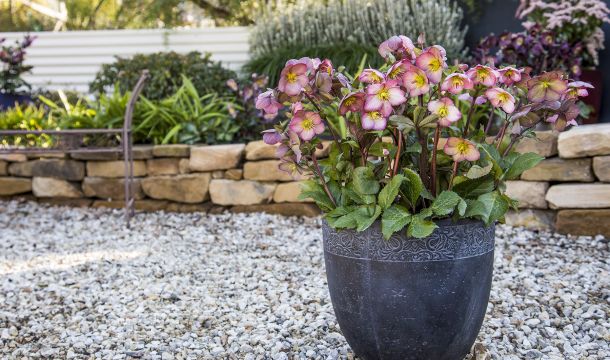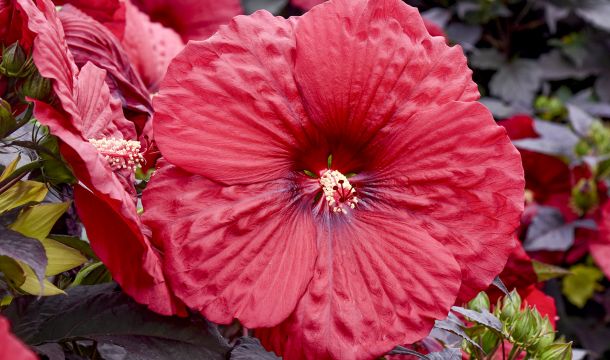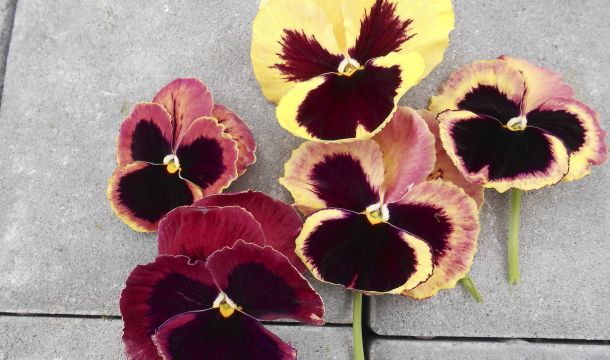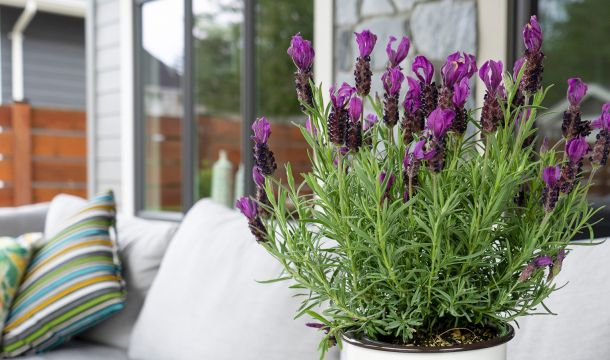A Buyer's Guide to Spring Impatiens

Due to a combination of factors, traditional Impatiens, the walleriana type, plays a useful new role in today’s retail marketplace for spring hangers and bedding. It offers an economy counterpoint to SunPatiens in these major categories. Grown from from seed the plants size up fast and furious, finishing in time for the basket and bedding bonanza known as May. Affordable inputs, short growing season, and good timing are hallmarks for economy-priced products with decent margins.
SunPatiens, by contrast, fills the mid-price point. It has several factors in its favor: more durable vegetation, resistance to disease for long-term health, a wider color selection including some nifty variegations, and pretty good deer resistance.
Walleriana, on the other hand, is the quick shot of color you enjoy in the spring, then rotate out for something else when the time comes. Colors are downscaled from the past, but the loss of this strength isn’t important for an economy product. The focus is on a basketful of beautiful flowers that flounce with a shake of a breeze in exchange for a great price.
Disease doesn’t drive away sales these days, but it has focused most sales into the retail channel and the May timeframe. Downy mildew is a late summer and autumn phenomenon when it appears, and lots of plants are sold on their spring beauty alone. Home gardeners have shorter memories than commercial accounts and they often forgive past sins, especially if they remember the flower with a nostalgic glow. The walleriana look, like the flouncy curls of Shirley Temple, are hard to replicate and even harder to forget.
The Beacon series is centered on the oranges. 'Coral' and 'Salmon' are similar shades, and even 'Rose' has a touch of orange · 'Blue Pearl' returns from its Super Elfin predecessor in limited supply, found only in Pearl Island Mix · 'Lipstick', another important Super Elfin color, becomes widely available in 2024.
| Beacon 'Lipstick' | Beacon Pearl Island Mix | Beacon 'Orange' |
#01: Deer Will Control the Package Sizes That Sell
Putting the brakes on wider walleriana adoption will be the deer pressure in your local area. Walleriana is deer-speak for *candy*. Striding through the neighborhood, deer will nibble plants as they go. If the bite tastes bad, the deer move on; if it tastes good, the deer will eat a plant to the ground. Bedding sizes like 6-packs, 4-inch, and 6-inch are more likely to be affected than hangers.
Suburban deer pressure doesn’t spread itself out like jam on bread, it works from the edges inward. Timid deer keep away from living zones, so beds on the sidewalk or fence edges are the first to disappear. Under moderate deer pressure the bedding close to the house starts to disappear. Only the boldest deer will walk onto the porch or deck. As a rule, hangers are less affected than bedding because deer look down to graze, not up, and they are usually reluctant to approach a house when given a choice of paths.
Walleriana sales rarely go to zero. Even in heavy deer areas, some Impatiens gardeners will have dogs. Canine scents and sounds form a protective force field around a yard that compels all but the most determined deer to move on to the neighbor’s yard. For a finger in the wind look to the Hosta. Uneaten leaves implies less pressure. Some chewing means moderate. Only stems means frequent visits.
Imaras are centered on the roses. 'Rose', 'Red' and 'Salmon Shades' are different hues of dark pink. Even their orange has some rose in it. · 'Red Star', 'Orange Star' and the Star Combi are the only patterned flowers available in either series. · Imara Mix, their everything mix, shows how dominate the reds are to the series.
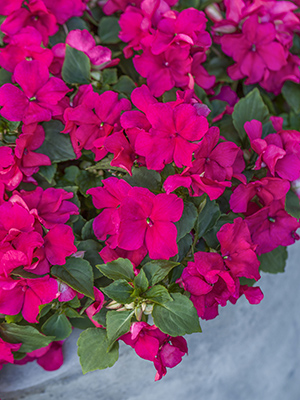 |
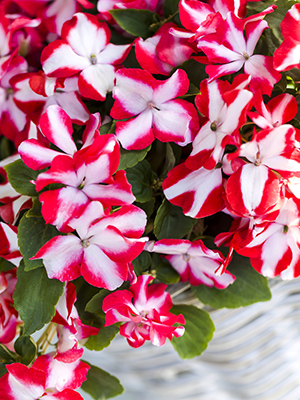 |
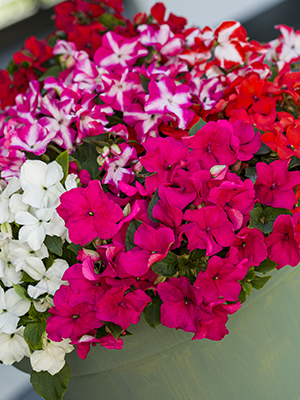 |
| Imara 'Rose' | Imara 'Red Star' | Imara Mix |
#02: Color Choices Are Streamlined And That’s OK
As mentioned before, walleriana functions as the economy model for hangers and bedding because it’s low cost and therefore low risk with a limited selection. A series with many color choices belongs in the mid-price point range where selection sells at a good margin. The limited range of walleriana makes the extensive color range of SunPatiens look even more appealing.
Looking over the walleriana choices, core colors are dominated by orange (Beacon) and rose (Imara). Both series have purple and white to anchor dark and light, with several mixes. Imara has the interesting star patterns, and Beacon is bringing back 'Lipstick' as a color in 2024. They also have 'Blue Pearl' in limited supply, found only in their Pearl Island Mix.
Color choices from older series might be available, but over time the supply channel has skinnied down to the Beacon/Imara selections. As demand drops for the other series and seed companies shift their emphasis elsewhere, expect to see a smaller field.
This is unfortunate news, but not earth-shaking either. A color-coated basket at a great price is the key promise for an economy model. Core colors, a few standouts, and mixes do the job.
Beacons follow the PanAmerican playbook for preferred style. They like the drama of a strong mound in the center, suitable for baskets and planters. The mound also appears when planted close together in flats and trays.
| Beacon 'Coral' | Beacon 'White' | Beacon Portland Mix |
#03: Recommended Sizes
The first size to plan for is the hanger, where the easiest and most protected revenues live. Mother’s Day should deliver a big spike as expected, especially if the nostalgia card is played with good pricing. Impatiens hangers continue to chug through May so baskets left over from the holiday still have a market for a few more weeks.
Don’t expect much from landscape sales. Landscapers need economy choices as well, but they have a greater fear of failure and a longer memory for it. The disease resistance of Beacon and Imara should claw back some of that market, but it will be a slow conversion. If the bedding market has some legs, focus on the dual-purpose 4-inch and 6-inch sizes that can switch from retail to commercial easily.
Imaras adopt the Syngenta house style for habit, an understated table top that likes to drape at the edges. This keeps pot-tight crops smooth and tight across the top, resisting the urge to leg-out on the retail shelf and extending the retail shelf life.
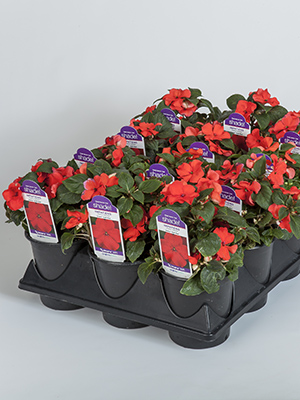 |
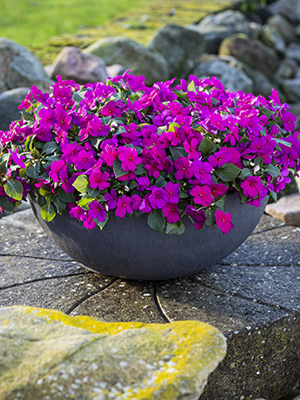 |
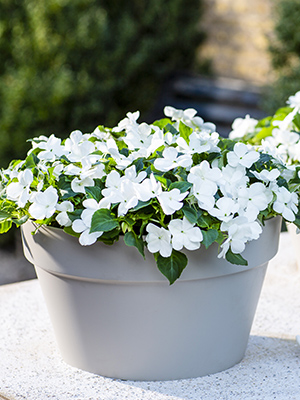 |
| Imara 'Red' | Imara 'Purple' | Imara 'White' |
#04: Focus On May Sales And Exit By June
Downy mildew has molded walleriana sales into a May crop. Hanger sales always spike for Mother’s Day, because a basket makes an attractive, affordable, and nostalgic gift; however, hanger sales chug during the other May weeks, closing out by Memorial Day. Bedding plant sales peak in mid-May but volumes are governed by the deer inside your customer footprint.
Whichever way you schedule, be sure to exit by Memorial Day. Walleriana is a May-focused crop. Early April is too cold and rough for the product, and sales trickle out by June. In short, sell walleriana as a spring-focused crop with incredibly heavy color coverage (“can’t see the green” heavy) at a good price to clear them out by June.
The speed at which you sell out will suggest if more should be ordered for the next year. Anything left over in June is likely to become a store pet rather than a store sale. Don’t overshoot Memorial Day—hold a clearance sale.
If you are just wading back into the walleriana waters, take a look at your SunPatiens sales and figure about half as much revenue coming in, split between hangers and 4-inch/6-inch material. Pull that back a bit because, in your first year, these will be your curiosity sales.
From there, it’s really a question of tailoring to local conditions, something an IGC specializes in anyway. These recommendations are a framework to generate ideas and consider alternatives, then sift out the best suggestions to form a cohesive plan.
Don't underestimate the creative power of affordable products. This big basket of Imara 'Orange' has inexpensive flowers, a simple wicker basket, and assembles quickly to create a memorable moment on a bench. Well-priced against the drama it creates, sales can reach higher volumes.
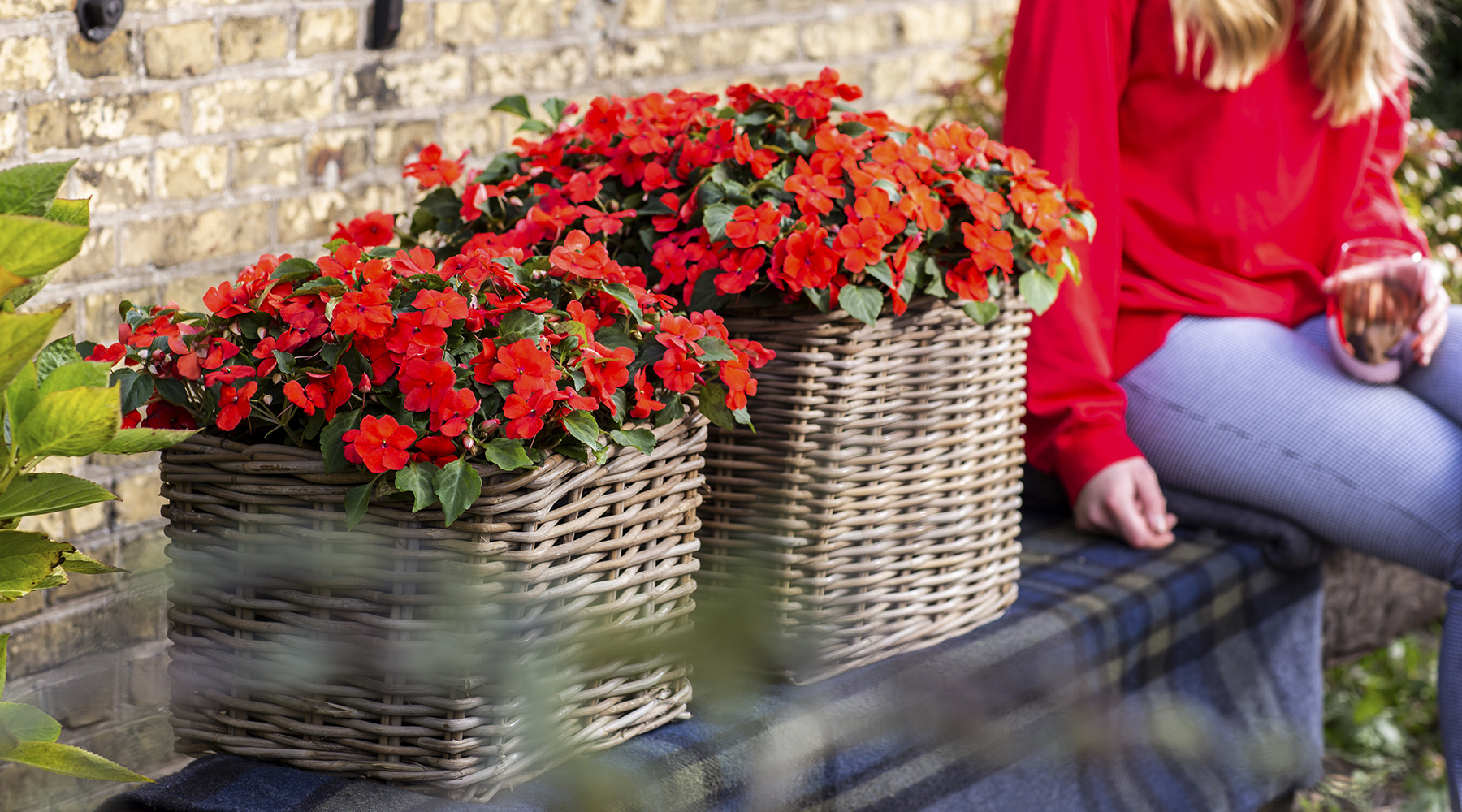
Popular Articles
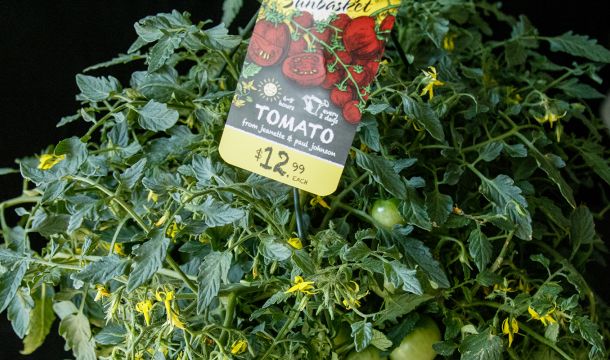
Trialing Edible Baskets

The Arthouse Expansion of Agastaches

The Strengths Behind Phlox Subulata


